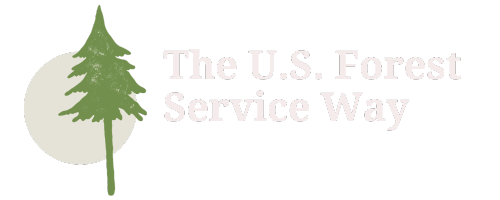When I initially developed a list in 2005, I described 16 characteristics of effective leaders. I realize no one could have ever met all 16. There are probably hundreds of behaviors that contribute to a person’s success and leadership style. I have reconsidered my initial list and dropped all but five. If you follow these five, you may not become a great leader, but you will never fail as a leader. If you understand these five, they will help you when you need to make changes.
- Integrity. This is about honesty, telling the truth, and being open to discussion (allowing people to disagree). It is about establishing a work culture that encourages–no demands—that everyone speak truth to power. Leadership requires followers. In the Forest Service, the primary characteristic is what Pinchot from the beginning called “character.” No one willingly follows a person who is perceived as lying or being manipulative or self-serving. Those who believe they are fooling people are delusionary. In my experience, people can sense when someone is not being truthful. It may take a while, but the buzzers in people’s heads start going off. You cannot fake it. I know people can end up in positions of responsibility who do not pass the test, but they, in my opinion, are not leaders. The Forest Service has always been in it for the long game.
- Trust. Trust is not automatically conferred, it is earned. I was told by someone in a leadership position that you had to make all the changes in the first six months, spend the next 18 months locking it in, and any time after that is just “country clubbing it.” Wrong. Research studies and my experience show it takes much longer. The historic model of moving people frequently was initially rooted in combating corruption. Also, when the agency was mostly 20-somethings led by 30-somethings and was rapidly expanding, people needed to move. But that is not today’s world. It was assumed that if someone spent a long time in one position or location, they would be subject to local pressures. But that was decades ago. We now know that trust is essential and takes time. It varies by individual, but it is not automatic. It is earned by one’s behavior over time and one step at a time.
- Self-Awareness. This is about knowing yourself, your hard-wired personality type, and your tendencies under pressure. Know your flat spots and surround yourself with people who can do things you can’t. I learned this from the Army War College training for senior officers. They spend three weeks on understanding personality types. We hardly spent one-half day, but it introduced people to the concept that a part of your tendencies is hard wired. It helps you strengthen personal mastery, and not allow yourself to be emotionally hijacked in confrontations. Successful leaders know their strengths and weaknesses. Fix or work around the flat spots. One sage Forest Supervisor once told me, “If you know someone’s strengths, you know one of their weaknesses—it is overplaying their strengths.” If a leader does not know what he/she is on the inside, they will not be able to communicate on the outside. This can be emotional for some. It was for me.
- Functional relationships. Functional relationships involve getting your needs met and seeing that others get their needs met as well. It is not about friendliness, although that can help too. More importantly, it is being able to understand and communicate so the other knows you understand. The most important skill is empathetic listening. It is not magic and a skill anyone can get. It is what professional therapists and psychologists use. They first build a relationship by knowing how to listen, and more importantly, responding in a way that communicates to the other that they have been heard. They listen to the feelings that the other is projecting, and then, in a tentative way, guess what causes the feeling. Some are naturals at this and do it unknowingly. But anyone, ANYONE, can get better at it. The example I use in the disgruntled employee who comes out of the office after a meeting with Forest Supervisor and says to his colleague, “He may have his head up his ass, but at least he listens.” That is a step in the right direction. When the gossip around the water cooler is, “He just never listens” it is not helpful.
- Reflection, and learning from experience. This is not always valued as much as it should in the agency, but it can be fixed. Universities have the sabbatical system that allows a tenured faculty member to have time to recharge and develop their capabilities. I think the Forest Service needs to create a sabbatical system for line officers. It may be viewed as perk, but it benefits the agency and the employee. The way people grow from experience is to reflect on the experience, and then make a change in their behavior. The way it works now is that when someone is doing an exceptional job dealing with a controversial issue, they are plucked out and immediately into another even more difficult situation. No one has the time to reflect and make some sense out of their experience.
In the last year of my time at Grey Towers, I asked the Director of the Northeastern Area if I could take a sabbatical of sorts. I felt exhausted. It was like being allowed to work from home mixed with freedom. I was given six months to work away from the office. It was in those six months that I thought of what I am writing today. I called it the Leadership Tree. I just never took the time to write it down. I am fixing that with this blog.
Well, that is my observation of successful leaders in the Forest Service. I could list a hundred other ones, but you can too. So go ahead and do it.
